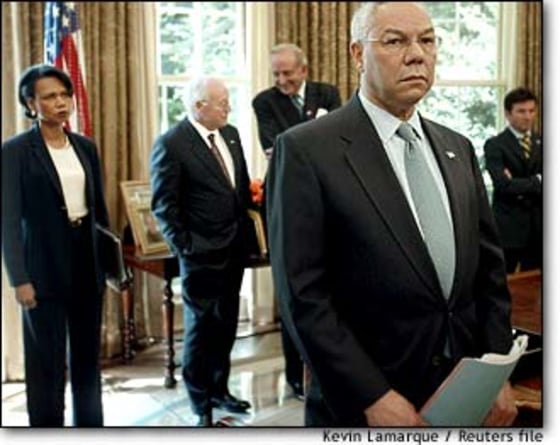The familiar drip, drip, drip of a brewing political scandal echoes through the power centers of Washington and London these days as the Bush administration and the government of British Prime Minister Tony Blair are pelted daily with increasingly pointed questions about the case they made for going to war against Iraq. The admission that the president made an apparently false allegation against Iraq in his State of the Union address was supposed to help put the issue to rest. Instead, it reopened fissures inside the administration and in Blair’s government over the validity of their case for war.
THE FAILURE to turn up chemical or biological weapons in Iraq — initially dismissed as a “sour grapes” issue by Bush insiders — is growing into a genuine political problem, dogging the British and U.S. leaders at every public appearance and sparking various agencies that had a hand in Iraq policy to begin plotting a course through the gathering storm.
Throughout the president’s Africa trip this week, for instance, Bush and Secretary of State Colin Powell were peppered with questions on Iraq’s weapons of mass destruction, and particularly on the president’s Jan. 28 claim that Iraq sought to purchase uranium from African countries that mine it.
The image of African leaders standing mutely by as their news conferences were transformed into debates on Iraq could not fail to recall similarly uncomfortable moments during Bill Clinton’s scandal-plagued administration.
But the comparisons end there. Clinton’s troubles were domestic, in the strictest sense, and largely dismissed as unimportant in the rest of the world. Today, with U.S. troops dying in Iraq at a rate even the White House sees as politically unsustainable, there is a palpable desire to lay to rest any questions about the war’s real motives and stem any further damage to U.S. and British credibility.
“They have to get by this, and they have to do that very soon,” says a source close to the Bush family, who requested anonymity. “The GOP can bottle up inquiries in Congress, but they can’t bottle up public opinion.”
DAMAGE CONTROL
As it became clear that yet another piece of prewar evidence had been discredited — and that many intelligence and diplomatic officials had already concluded the charge was false even before the president’s speech — efforts to control the damage took center stage. Bush told reporters in Africa on Friday that his State of the Union speech “was cleared by the intelligence services. And it was a speech that detailed to the American people the dangers posed by the Saddam Hussein regime, and my government took appropriate response to those dangers.”
His national security adviser, Condoleezza Rice, added that if the CIA director, George Tenet, had any objections about the Africa uranium claim, “he did not make them known.” But the CIA, sensing once again it might become a scapegoat, leaked its own take on the affair to the Washington Post, stressing that the CIA had gone so far as to warn the British that “State Department analysts were questioning its accuracy when it came to Niger and that CIA personnel considered reports on other African countries to be ‘sketchy.’”
On still another tack, Defense Secretary Donald Rumsfeld on Wednesday told Congress that the decision to go to war was far more complex than the WMD issue and really was not centered on whether Iraq had new or ongoing WMD programs.
“The coalition did not act in Iraq because we had discovered dramatic new evidence of Iraq’s pursuit of weapons of mass murder,” Rumsfeld said. “We acted because we saw the existing evidence in a new light through the prism of our experience on Sept. 11.” Rumsfeld’s statement echoed an earlier assertion from his deputy, Paul Wolfowitz, who said the WMD issue was chosen “for convenience” so the administration could lay out a case against Iraq at the United Nations.
‘CRYING WOLFOWITZ’?
The ferocity of the leaking and spinning that has followed the White House retraction reflects lingering splits inside the U.S. government over Iraq. The State Department, the military officer corps and many CIA officials were very wary of the idea of an invasion of Iraq and skeptical of intelligence painting Saddam as a “clear and present danger” to the United States even as Osama bin Laden remained at large.
Greg Thielmann, who ran military assessments at the State Department’s Bureau of Intelligence and Research until October, said intelligence clearly was manipulated to make the most hawkish case possible for war. He told Congress at the same hearing Rumsfeld attended that data on the Iraqi threat was “misrepresented on the part of the administration.”

He also noted that Powell, his former boss, did not repeat the Iraqi uranium allegation during his own presentations of the case for war.
The infighting, and the admission that a key allegation is probably incorrect, also has emboldened those who have argued all along that the war was fought for reasons other than those stated. Even Democrats who have been tremendously wary of criticizing a popular president while troops are in the field are beginning to stir, though most, like Connecticut Democrat and presidential hopeful Joseph Lieberman, prefer to view it as a case of intelligence agencies misleading the president, rather than the president misleading the nation.
Even before the African uranium charge was withdrawn, leaks from U.S. and British intelligence agencies had raised questions about whether the administration jury-rigged prewar intelligence to paint a far more threatening picture of Iraq’s arsenal than data otherwise suggested. Washington wits have coined the phrase “crying Wolfowitz” to describe the phenomenon, a reference to the deputy defense secretary who was perhaps the administration’s leading Iraq hawk.
More substantively, each week has brought new revelations about the shortcomings of “coalition” intelligence. With the war still raging, enormous gaffes committed by British agents came to light, including admissions that some accusations in a highly touted “dossier” on Iraq actually were lifted from a U.S. grad student’s 12-year-old doctoral thesis, casting doubts on the reliability of Britain’s normally well-regarded spy agency, MI-6.
Prewar Israeli intelligence suggesting Saddam’s ballistic missile arsenal might be as large as two dozen Scuds also has been largely discredited, though some Israeli sources continue to claim Iraq hid much of its banned material across the border in Syria before the war began.
In May, sensing a gathering storm over the “missing” WMD, U.S. intelligence analysts began leaking complaints to U.S. news outlets suggesting that they were pressured to “bury,” in the words of one, any analysis that did not support the most alarmist view of the Iraqi threat.
In early June, two strangely outfitted trailers were discovered that seemed to fit the description of the “mobile biological weapons labs” Powell accused the Iraqis of operating in a February speech to the U.N. Security Council. No weapons material was found in the trailers, however, and within two weeks, unnamed U.S. intelligence officials had told the Washington Post that the administration suppressed analysts’ reports that concluded the trailers were likely to have been just what the Iraqis claimed they were: support trailers used to inflate weather balloons.
LANCING THE BOIL
By late May, having spent the previous month insisting WMD discoveries were just a matter of time, senior administration officials and the president himself began to hedge a bit, stressing the difficulty of finding such caches without cooperation from Iraqi experts, and even raising the possibility these weapons had been destroyed before the war began.
The Pentagon also moved to quash reports that it had orchestrated efforts to “sex up” intelligence on Iraq. In early June, Deputy Defense Secretary Douglas Feith, who coordinates intelligence gathering for Rumsfeld, appeared before Congress to deny these intelligence analysts’ allegations.
“This suggestion that we said to them, ‘This is what we’re looking for. Go find it,’ is precisely the inaccuracy we are here to rebut. I know of nobody who pressured anybody,” Feith said.
At the same time, Blair faced down a parliamentary inquiry, insisting that U.S. and British statements on Iraq were based on genuine concerns and the best intelligence available. While the inquiry on Monday acquitted Blair and his Cabinet of misleading Parliament, the British leader remains under fire by angry members of his Labor Party now trying to prove the war was “illegal” because it was based on allegations that cannot be proven. Of particular damage have been accusations from Blair’s former foreign secretary, Robin Cook, who has characterized the Iraq war as a Bush family vendetta.
“This was a war made in Washington, pushed by a handful of neoconservatives and pursued for reasons of U.S. foreign strategy and domestic politics,” Cook wrote in the London daily The Independent on Friday. Cook’s broadside coincided with new statements from anonymous British Cabinet members saying they now had very little expectation that any banned weapons would ever be found in Iraq.
Michael Moran is MSNBC.com’s senior correspondent.
